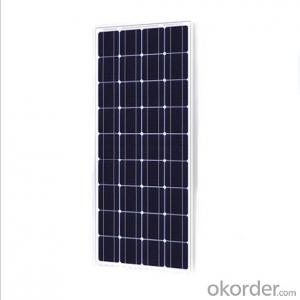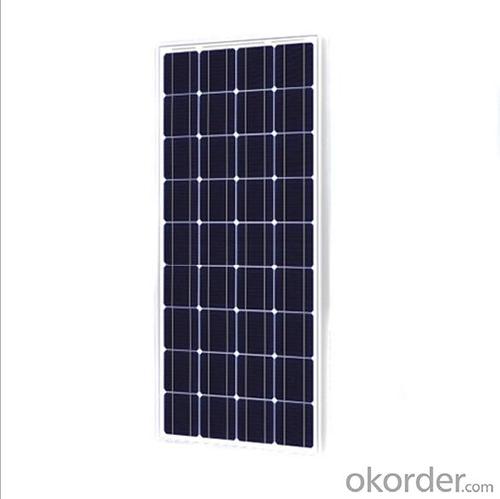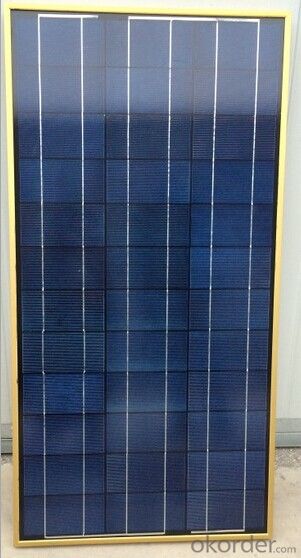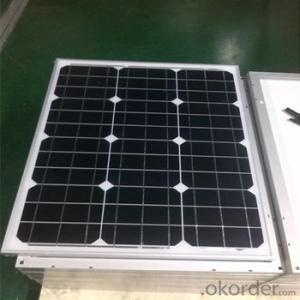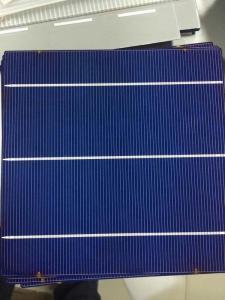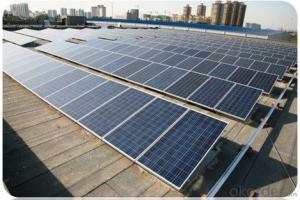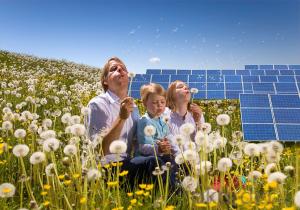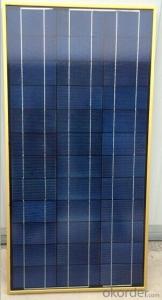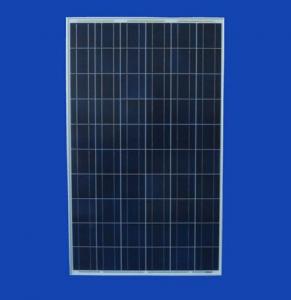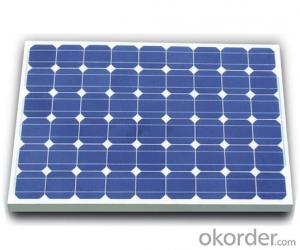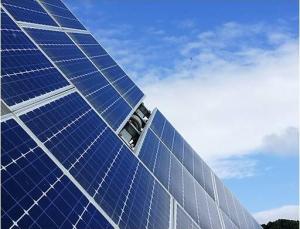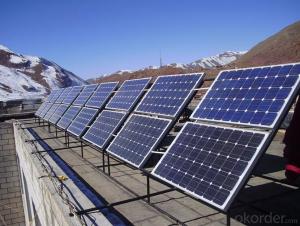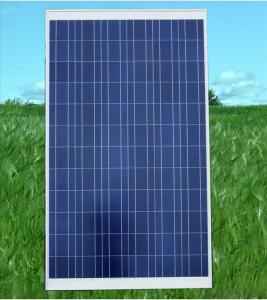20kw Poly-Crystalline Silicon Solar Module 60w
- Loading Port:
- China Main Port
- Payment Terms:
- TT or LC
- Min Order Qty:
- -
- Supply Capability:
- -
OKorder Service Pledge
OKorder Financial Service
You Might Also Like
1.Structure of Solar Module Description
CNBM Solar's photovoltaic module is designed for designed for large electrical power requirement. It is the optimal choice for both on-grid and off-grid power systems. CNBM Solar offers high performance of power per square foot of solar array.
2.Main Features of the Solar Module
Solar Cell: High efficency crystalline solar cell. Even if under the weak light, the solar module can produce maximum power output.
Tempered glass: Anti-reflecting coating and high transmission rate glass increase the power output and mechanical strength of solar module.
EVA and TPT: Using high quality EVA and TPT to prevent destroying and water.
Strong aluminum frames to strengthen the load hold and to stand against high wind.
Junction box: Multi function junction box with water proof.
Long lifetime: ≥25 years; Less power decrease.
Good performance of preventing from atrocious weather such as wind and hails.
Resisting moisture and etching effectively, not effected by geology.
The certificate issued by international authority: UL, TUV, IEC, VDE, CE.
3.Solar Module Images
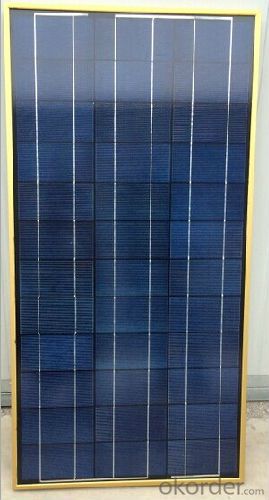
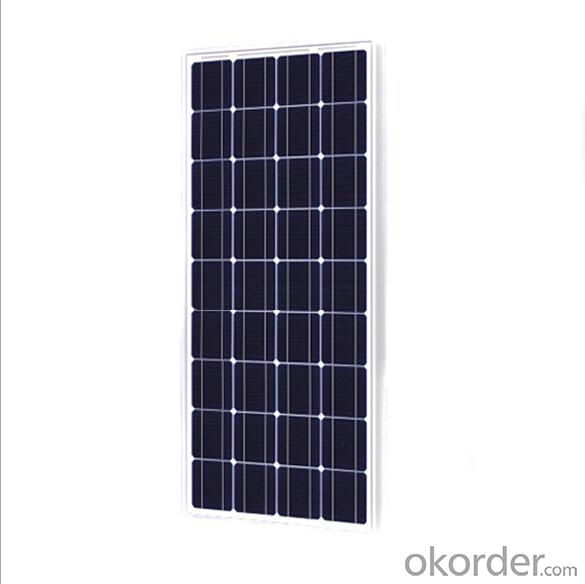
4.Solar Module Specification
Solar panel pv module manufacturer
High efficiency: mono panel 18% poly panel 17%
30W-300W mono solar panel poly solar module
Mono-crystalline Solar Panel / Poly-crystalline Solar Panel
We Are Manufacturer
We manufacture mono solar panel and poly solar panel from 30W-300W
We produce Solar PV module from solar cell to solar module
We are capable to produce 2MW solar panels per month
Warranty
5 years material and workmanship warranty
10 years at 90% of the minimal rated power output
25 years at 80% of the minimal rated power output
Specifications
Electrical Spec. | Pmax | 240W |
Vmp | 35V | |
Imp | 6.86A | |
Voc | 43V | |
Isc | 7.77A | |
Physical Spec. | Cell Material | Poly |
Wind Resistance | 60m/s | |
Surf. Load-bearing | 200kg/m2 | |
Hail Load-capacity | 25mm, 80km/h | |
Packaging Data | Dimensions (mm) | 990*1600*35 |
Weight | 25kg | |
20’ Container | 224pcs | |
40’ Container | 448pcs | |
Temp. Coefficients (TC) | NOCT | 45°C±2°C |
Current TC | 0.06±0.01%/K | |
Voltage TC | -(155±10)mV/K | |
Power TC | -(0.5±0.05)%/K |
Product Details
Advanced EVA encapsulation system with triple-layer back sheet meets the most stringent safety requirements for high-voltage operation
Anodized aluminum frame: The sturdy, anodized aluminum frame allows the modules to be mounted on a variety of standard racking systems and to withstand harshest conditions
Ultra reliable bypass diodes prevent damage through overheating due to shaded or defective cells
Packing method: Innovative, environmentally friendly packing method using pile-edges insures modules arrive in perfect condition
New frame design incorporating hexagonal shaped Drainage holes, with more grounding holes, provide flexible installation and using
Waterproof Battery Box
Waterproof battery box, ideal for high humidity area
Air-bleed vent design, specially for gel and lead acid battery
High strength: PVC plastic box and wire reinforced PVC conduit
5.FAQ of Solar Module
1. Q: Do you have your own factory?
A: Yes, we have. Our factory located in Jiangyin city, jiangsu province.
2. Q: How can I visit your factory?
A: Before you take off from your country, please let us know. We will show you the way,or arrange time to pick you up if possible.
3. Q: Do you provide free sample?
A: Usually we do not offer free sample
4. Q: Could you print our company LOGO on the nameplate and package?
A: Yes, we can do that.
- Q: we are trying to reduce a solar panel from 9 volts to 3 volts. What do we need to make this work...
- Solar panels generate DC power. Changing DC voltage is hard, which is why the power grid is AC voltage. AC voltage can easily be changed with a transformer. To keep the DC power (watts) the same at a lower voltage you need a DC to DC converter. That basically changes the power to AC with an inverter, changes the AC voltage to the new value, then rectifies it back to DC. It is probably hard to find a commercial unit that handles those voltages and then it will be expensive. But I have a simple solution in the special case of a solar panel. Solar panels are made up of smaller solar cells. The basic solar cell has a very low voltage, like half a volt. The panel has many of them connected in series to make a higher voltage. Just cover (shade) some of them and the voltage generated by the panel will be less. Of course that reduces the power. And you may need to experiment with shading different parts of the panel and measuring the result with volt meter.
- Q: How do solar panels affect the local job market?
- Solar panels can have a positive impact on the local job market. Their installation and maintenance can create new employment opportunities in the renewable energy sector, leading to job growth. Additionally, the development of solar farms and manufacturing facilities can attract investments and create more jobs in the local economy.
- Q: I have a home in Manchester Tn and we have been slowly remodeling the home. It is about 200 sq ft of living space. Our normal electric bill is about 50 a month. We would like to add some solar panels to the home to help reduce the amount of the bill. How many panels do I need and what would be the cost? I am not trying to go completely of the grid but I would like to start somewhere and maybe over the years be able to add. What is your recommendation for a reasonable cost of under 2 to 3 k??
- Ok, well there are also other alternative energy sources, too, besides solar. There is tidal (but you need an ocean :] ), hydroelectric (river, stream, etc.), biomass/biofuels (burning garabage), geothermal (from within the earth, pipes in the earth), wind (windmills, wind, the sun to get wind), and there are others that don't come to mind. Solar energy would cost alot to be installed, and it would take up alot of space, but once installed it pays for itself and uses little to no labor. They all have positives and negatives. All of these are clean and renewable. Here are some sites that my teacher/professor gave us (we just ended alternative energy lesson.) Well I hoped this helped!
- Q: Can solar panels be integrated into building materials?
- Yes, solar panels can be integrated into building materials. This innovative approach, known as building-integrated photovoltaics (BIPV), allows solar panels to be seamlessly incorporated into various architectural elements such as roofs, facades, windows, and even entire building structures. BIPV offers a dual function by serving as both a source of renewable energy and a structural component, enabling buildings to generate sustainable electricity while maintaining aesthetic appeal.
- Q: Would like to know if the DIY Solar panel systems can be as efficient as a commercial grade panel.
- On my website you can read my story of how my dad made solar panels at home and now he pays nothing to the electric company.
- Q: Can solar panels be installed on water pumps?
- Yes, solar panels can be installed on water pumps. Solar-powered water pumps are becoming increasingly popular and are a sustainable solution for providing water in remote areas or off-grid locations. These pumps use solar energy to power their operation, making them environmentally friendly and cost-effective in the long run.
- Q: Can solar panels be installed on a canopy or pergola?
- Yes, solar panels can be installed on a canopy or pergola. In fact, installing solar panels on these structures can provide dual benefits, offering shade and generating renewable energy simultaneously. This innovative approach allows for the efficient utilization of space and can be a great solution for homeowners or businesses looking to maximize their solar energy production while enhancing their outdoor living spaces.
- Q: How do solar panels affect the property's overall sustainability?
- Solar panels can significantly improve a property's overall sustainability by harnessing clean, renewable energy from the sun. By generating electricity without emitting harmful greenhouse gases, solar panels reduce the property's carbon footprint and help combat climate change. Additionally, solar panels can lower energy bills, increase energy independence, and potentially provide a source of income through net metering or selling excess electricity back to the grid.
- Q: I want to build a standalone wifi repeater -- powered by the sun. The problem is how much solar power and how big of a battery?net draw 4.5v @ 0.66A with loadnet draw 4.5v @ 0.60A no loadI'm assuming the best choice would be a 6v battery with a a couple diodes in series to induce ~.5v drop. Then, I need something to charge it -- I found 2v 6w solar chargers in the automotive section of Sears and 6v 2w solar chargers in the marine section of Dick's Sporting Goods.How many solar panels and what capacity batteries should I use? Is this the best method or should I use a voltage regulator and go with 2v batteries?I need this to be as cheap and simple as possible...
- I do not know, but there is a house in Lafayette which was built with solar power. It was to have a solar system, so the contractor's first act was to put up a solar array on the property. It had battery backup, and was used to provide the electrical power during construction. during completion of the house the solar system was installed on the roof of the house.
- Q: I have a building company in UK and am interested in becoming a solar panel installation contractor
- You okorder
Send your message to us
20kw Poly-Crystalline Silicon Solar Module 60w
- Loading Port:
- China Main Port
- Payment Terms:
- TT or LC
- Min Order Qty:
- -
- Supply Capability:
- -
OKorder Service Pledge
OKorder Financial Service
Similar products
Hot products
Hot Searches
Related keywords
